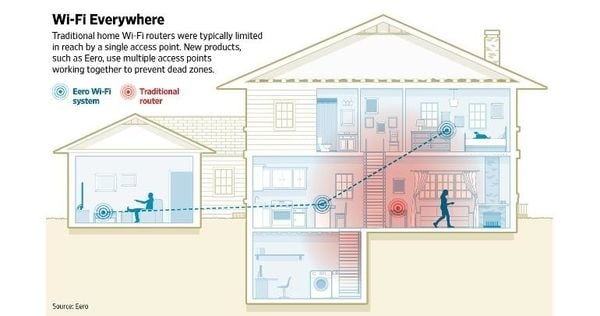
Top 5 Concerns of Security Directors and Managers
December 6, 2018
10 Algorithms Every Data Scientist Should Know
December 11, 2018Aren’t you tired of all those moments when you have to move with your laptop from one room to another and all of the sudden, blip, you discover that your wi-fi range is not wide enough? Despite what many would think, mesh networking is not just another fancy term for wi-fi networking.
Especially for your home or small office, mesh networking is a step forward in terms of connectivity. When you think of a regular home, the most basic internet connectivity consists of a router which provides internet coverage as much as possible. A mesh network, on the other hand, comes with multiple routers, each of them providing sufficient coverage anywhere in your house.
By definition, a mesh network is made of interlocked routers called nodes. These nodes connect to each other and offer internet coverage over a larger area, something that a traditional home network cannot do.

How Is Mesh Networking Different?
A wi-fi extender is a good idea for a home or small office because it increases the wi-fi signal throughout the area. Extenders are excellent if you install them in a not-too-large space. However, when we are talking about a space lying on different floors or a larger area, then you will see that wi-fi extenders are not so effective anymore. They will remain cost-efficient, but you should also compare their effectiveness also.
With a mesh network, you solve one of the most disturbing problems, that of having dead spots in your space. Mesh networks provide a better coverage by incorporating different hubs which communicate with one another. In addition, setting up a mesh network is not difficult at all. Furthermore, each hub represents a separate router, offering enough coverage in any area of your small office or home. However, they are not perfect either as they are quite expensive. Moreover, placing a lot of devices around your home or small office can represent a drawback for some.
Advantages of Mesh Networking
Mesh networks have been designed to offer easy network access. This is what makes them so popular in comparison to traditional routers.
2. Streamlined connection
You don’t need to constantly re-establish the connection as you move from one room to another. In addition, all your access points will have the same signal quality and strength. So, this means no more lag.
3. Better security
Easy management is not everything when we think about mesh-networks. Good security support is also another advantage that made us consider this option as the best replacement for traditional routers. It allows you to easily and automatically check and install firmware updates. What is more, the newly launched devices offer an advanced feature of screening out and blocking any malicious websites.

Are there any drawbacks? No matter how advanced they are, mesh networks are not perfect. Here are some of the drawbacks that might make you have second thoughts:
- Increased costs – in comparison to traditional routers, this is the costliest option. If you opt for a top-notch mesh network, you will have to pay around $300 or even more. You will add to this cost the add-on satellites which will cost you between $100 and $200. In comparison to the costs of a traditional router, the costs are double. However, if we would compare the costs with the efficiency, then it is more than obvious that the mesh network wins.
- Too much equipment – most of the access points necessary to create an effective mesh network are very small and discreet. The producers have done their best to come with elegant and good-looking designs so that they will match to any type of home interior. However, setting up a mesh network may require installing several of these devices throughout your home or small office. Therefore, you may find it problematic, especially when you are the type of person who prefers minimal design.
If you wonder if your house or small office is big enough to support a mesh network, the answer is very simple. Usually, if you need internet for several floors, or your small office includes several rooms, then a mesh network is exactly what you need.
You can strategically place nodes on each floor and provide the necessary wi-fi coverage. If you live in a one-room apartment, then it is obvious that a mesh network is too much for you.
Not sure which equipment to choose? There have been several tests done on Eero, Google Wifi, and Netgear’s Orbi. Out of the three, Orbi delivered the best results in terms of speed. Eero and Google Wifi had pretty much the same speed results. However, a mesh network is more than just speed. Therefore, the tests were done also on app easiness to understand. Eero was the winner on this section, providing an easy-to-understand app which allows you to check the status of your wi-fi systems.
Google Wi-Fi comes next in terms of accessibility. In terms of design, Orbi is in the last place, having a bulky design and making you rather hide it somewhere behind some books. However, this would only weaken the signal. So, you either match it with the room’s design, or you opt for the other two alternatives.
The good news is that you don’t have to deal with dead zones or connection gaps anymore. Now, you have mesh networks to help you stay connected wherever you are. No more router resets and antenna adjustments. You need to keep up the pace with the technology trends and use this innovative solution to do your work.
